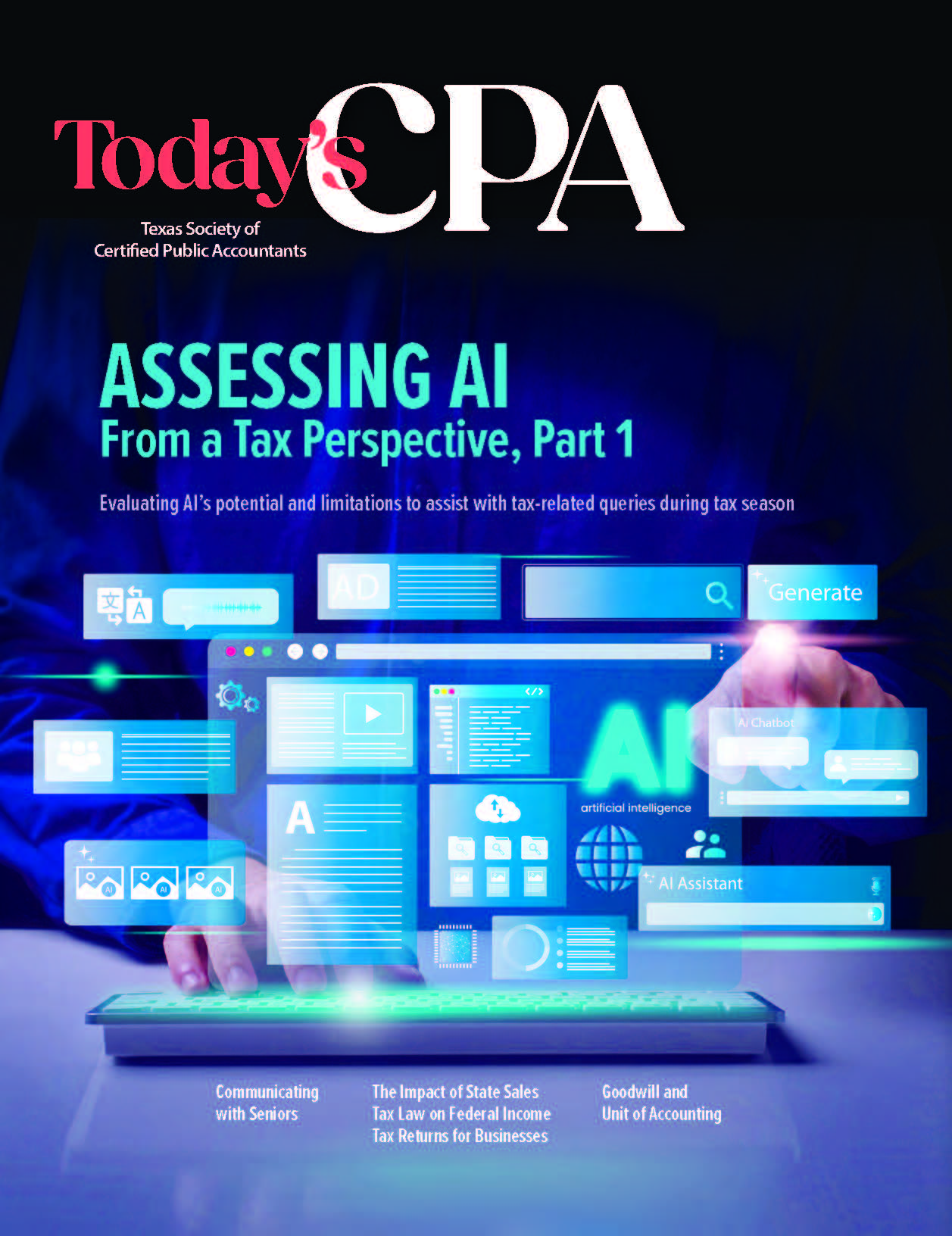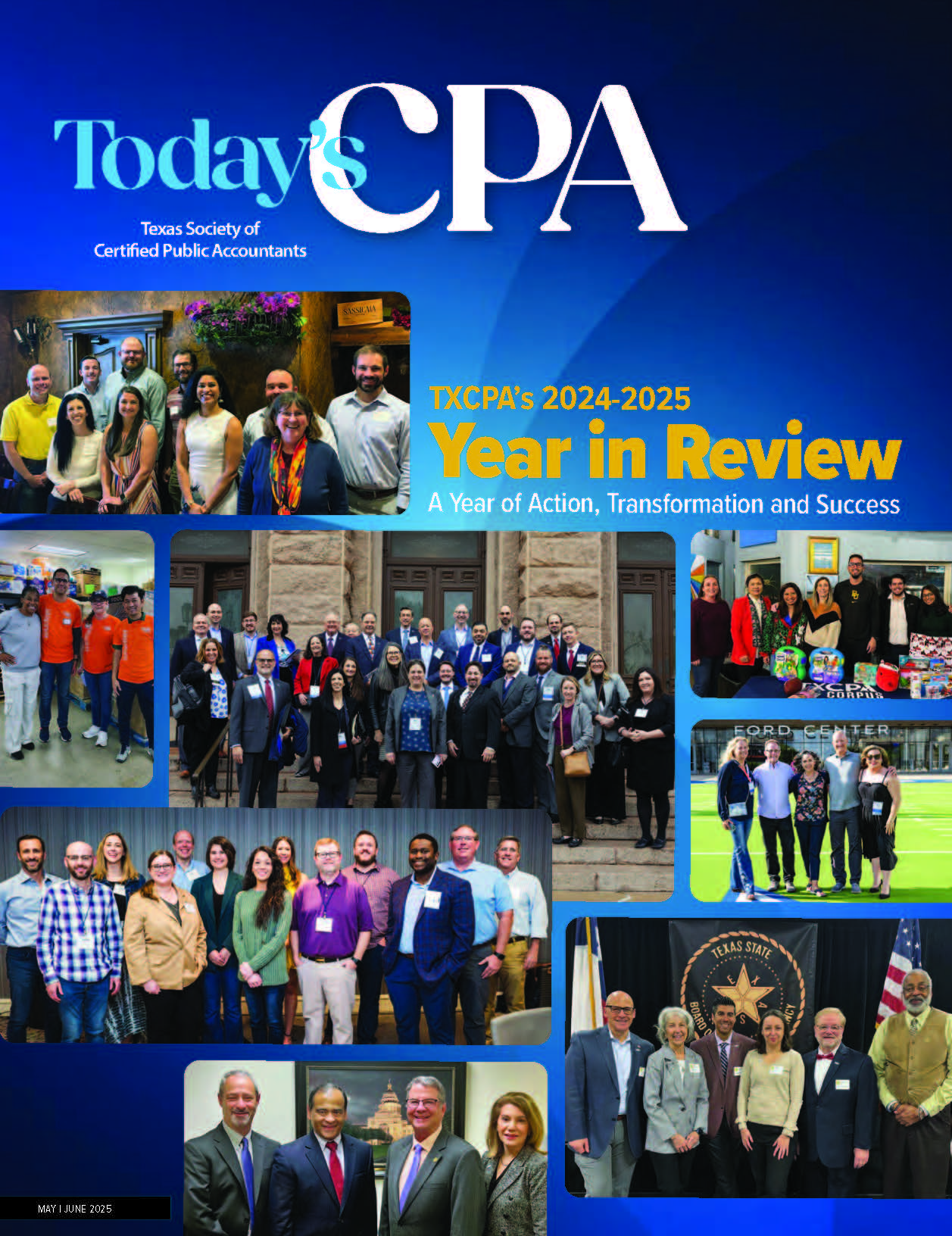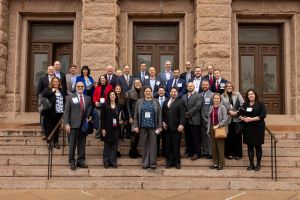January 15, 2025
Communicating with Senior Clients
Tips Acquired with Age, Experience and Science
By Susan Sorensen, Ph.D., CPA, and Limin “Priscilla” Zhu, DBA, MBA, CPA
Understanding normal, age-related changes and adjusting a few minor things can help CPAs improve communication with senior clients. The suggestions included in this article are based on research combined with years of experience in professional practice and experience as a senior.
Not all communication differences are related to a person’s generation category. Some differences are natural, age-related changes that will occur to every generation as they age. Just like computers, our brains have basic memory functions like encoding, storing and retrieving information.
Unlike computers with fixed capabilities, research on the human brain addresses average changes observed and acknowledges there is a lot of diversity between individuals of the same chronological age. Changes, not related to serious medical conditions, do not make clients less competent, but they can appear that way to others.
Many changes occur slowly over time and individuals may not be consciously aware of them. For example, the common perception that time passes faster and faster as we age. One hypothesis being studied is that perception of time is related to the speed at which our eyes take in mental images. There is evidence that the rate gradually decreases as adults age. If perception of time is affected by the number of images per minute, clock time would be perceived to go faster as we age. Understanding processes like this provides valuable insights into changes that come with aging.
Suggestions for Communication Adjustments
George Bernard Shaw is reported to have said that the “single biggest problem in communication is the illusion that it has taken place.” Understanding and making minor adjustments when communicating with senior clients can compensate for many of these changes. Following are eight tips.
1. Consider adapting the pace of communication. Communicating too fast can reduce the amount of information being processed and retained by the senior listener. However, communicating too slowly can seem patronizing. Awareness can help us “read the room” and adjust. Consider an old technique where teachers were encouraged to count seconds to become aware of how long even five seconds can seem when waiting for a response.
2. Incorporate more visual elements during discussions. Consider putting things in checklists and/or providing takeaway points in writing to provide an additional avenue for clarification and understanding. By implementing these visual and written aids, it can assure a more effective communication environment.
3. Encourage notetaking by providing paper and time for the client to take notes. This is beneficial for anyone, at any age, when they do not have a context in which to understand new material being presented. This may be especially helpful for seniors who may have less contextual knowledge, especially in areas like technology.
4. Allow ample time for decision making. Research indicates that information processing time increases with age. Again, it is easy to overestimate the length of a pause; therefore, if possible, provide resources so the senior clients can study at their own pace before a decision needs to be made. Be aware that asking for advice does not mean asking someone else to make your decision. If you believe that an older person needs more help, you may unintentionally push harder for your opinion to be accepted.
5. Be respectful that senior clients may be reluctant to change, including adopting new technology. Be understanding that change, even positive change, may induce stress. Everyone makes mistakes, but seniors may be more risk averse and prefer safety over saving time.
6. Understand trust as a multifaceted concept. Research has shown that trust is a complex thing and aspects of being able to decide who to trust may be affected by age. Seniors are targeted by all kinds of scams and need to be continuously vigilant. Our ethics and internal control training teaches us that no one should be blindly trusted, so be aware that when you ask seniors to blindly trust you, you may be teaching them to blindly trust others.
7. Avoid speaking softly, turning away or having a conversation with background noise. Avoid putting the other person in a situation where they may be embarrassed to admit that they missed something and feel the need to guess what was said. Be mindful that having excellent hearing for a 70-year-old is not the same as excellent hearing for a 35-year-old. Despite the advancements in hearing aids, it is essential to understand that they do not compensate for all age-related changes. Try speaking in a deeper voice, which is often easier to understand given the normal changes in the auditory range over time.
8. Unless you have knowledge and evidence of a medical issue, avoid unconsciously using “elderspeak.” Elderspeak has been defined as an inappropriate, simplified speech register that often sounds like the voice many people unconsciously use when talking to a baby or small child. Concerns about the negative effect of inappropriate communication have been addressed by organizations like the National Institute of Health.
Keep in mind that aging and the related changes can be a delicate subject. If CPAs are impatient and insist on communicating the same with everyone, they may perceive a lack of cognitive abilities that does not exist. The perception of being treated differently can make a senior defensive and affect the professional relationship.
Some of the Science Behind the Suggestions - Types of Memory and Age-Related Changes
The following brief definitions are not a comprehensive list. This list is intended as an introduction to support the recommendations. More extensive definitions are available on medical research websites.
Semantic Memory. Semantic memory refers to the general knowledge accumulated over time and includes our existing knowledge of facts. It can be referred to as our long-term store of knowledge. It accumulates over time and can be used to help learn new information. Research indicates that this type of memory may be resistant to aging.
Procedural Memory. Procedural memory may also be called implicit memory. It is a type of long-term memory that allows us to perform many types of activities without having to consciously control each required action. Driving a car is a common example. While the driver must remain alert to what is going on, the driver does not need to consciously think about each body movement required to slow down and turn a corner. Types of procedural memories vary based on our experiences. Research indicates that procedural memory often remains stable or may even improve with age unless there are age-related health issues such as a stroke.
Episodic Memory. Episodic memory is what is commonly thought of as memory. It includes remembering current and past personal experiences. Research indicates that this type of memory tends to decline with age.
Prospective Memory. Prospective memory refers to remembering to perform intended tasks in the future without an explicit reminder. It includes remembering to interrupt current activities to perform a pre-planned task at a certain time. For CPA firm clients, this could include actions like paying estimated tax payments on a specific date in the future. Research indicates that age-related changes in prospective memory can occur.
Visual Memory. Visual memory refers to the ability to recall images after you have seen the image. It includes the retention and retrieval of information gathered visually. Research has shown that visual working memory declines as adults age.
Echoic Memory. Echoic memory stores auditory information (sound). When listening to a conversation, especially new or difficult material, the information must be stored and processed to be understood. The ability to take in auditory information can be affected by the pace of the speaker, as well as factors such as the frequency of the sound. Research indicates this ability to store sound declines with age, along with a reduction in the range of frequencies that can be heard.
Working Memory. Working memory is the amount of information that can be held in the mind and used at any given time to facilitate planning, comprehension and problem-solving. Research indicates that working memory may decline since it involves temporarily holding and processing information when completing cognitive tasks. Working memory, like RAM in a computer, is said to be limited for everyone and those limitations, on average, increase with age. A decline in working memory can make it more difficult to quickly learn and process new information.
Summary
It can be difficult to judge how to adapt communication for senior clients because, unlike judging a child’s abilities by chronological age, white hair and wrinkles are not the best indicator of cognitive abilities. Understanding normal changes that occur can help CPAs to adapt their communications with senior clients.
By understanding and addressing the taboo subject of age-related changes, communication can be improved and help foster positive relationships with senior clients.
About the Authors: Susan Sorensen, Ph.D., CPA, is associate professor at the University of Houston-Clear Lake. Contact her at sorensen@uhcl.edu. Limin “Priscilla” Zhu, DBA, MBA, CPA, is professor of practice at the University of Houston C. T. Bauer College of Business.


Thanks to the Sponsors of Today's CPA Magazine
This content was made possible by the sponsors of this issue of Today's CPA Magazine:

















